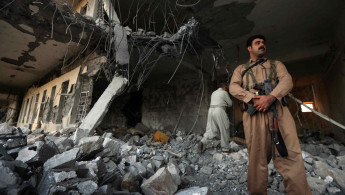Iran and Turkey up the ante with targeted attacks on Kurdish groups
Iran and Turkey are using more advanced methods to decisively harm enemy Kurdish groups beyond their borders, a development that could have far-reaching ramifications.
On Saturday September 8, Iran launched one of its most serious attacks on the autonomous Iraqi Kurdistan region in years. Rockets fired from inside Iran struck headquarters belonging to Iranian Kurdish opposition groups in exile - the Kurdistan Democratic Party of Iran (KDP-I) and the Democratic Party of Iranian Kurdistan (PDKI) - in the Kurdish city of Koya, approximately 70km from Iraqi Kurdistan's capital, Erbil.
The attack took place while the groups were holding a leadership meeting. At least 15 people were killed and 47 wounded, including a member of the PDKI's leadership, Mohammed Qadir Zada.
The attack was significant since it demonstrated that Iran is capable of hitting precise targets from long distances. The Iranian Islamic Revolutionary Guard Corps (IRGC) paramilitary group, which often skirmishes with Kurdish fighters along the border between Iran and Iraqi Kurdistan, executed this attack using drones and seven Fateh-110 short-range ballistic missiles.
 |
Masoud Barzani condemned Iran's missile attack and urging 'all sides' to refrain from resorting to violence |  |
According to the IRGC-affiliated Tasnim News the Fateh-110s were fired from 220km away. The drones relayed back information about the targets and filmed the impacts to confirm the strike's success.
Iran and the KDPI previously fought a war but agreed to a ceasefire in 1996. That ceasefire broke down two years ago when the KDPI resumed their insurgency against Tehran. While the group is headquartered in Iraqi Kurdistan the Kurdistan Regional Government (KRG) authorities have not in any way endorsed or supported its war with Iran and have invariably advocated peace to prevent the region from once again becoming a battlefield.
Kurdish President Masoud Barzani condemned Iran's missile attack and urged "all sides" to refrain from resorting to violence, saying a peaceful approach should instead be pursued.
Iran's ballistic missile capabilities were significantly limited in the 1980s during its war with Iraq when Iraqi Scud missiles terrorised Tehran. Iran managed to procure its own Scuds from Libya and North Korea but never used them to the same effect, nor caused as much devastation, against Iraq as Iraq did against it.
Twitter Post
|
Iran would later build on its capability and on several occasions in the 1990s used its own Scuds to target bases in Iraq belonging to the People's Mujahedin of Iran (MEK) militant group hosted by Saddam Hussein. It has since developed more accurate missiles and Saturday's attack demonstrated that it has the capability of striking individual buildings from more than 200km away.
In June 2017, following an attack on the Iranian parliament, Tehran also demonstrated that its ballistic missiles could hit targets as far away as the eastern Syrian city of Deir ez-Zour, a distance of about 650km.
Saturday's attack came less than a month after Turkey demonstrated it too is using more precision-guided means to afflict damage against its Kurdish adversary, the Kurdistan Workers' Party (PKK).
On August 15, a senior PKK figure named Ismail Ozden, also known as Zaki Shingali, was killed in Iraq's Sinjar region by Turkish drones backed by F-16 jet fighter-bombers. Shingali was traveling in his convoy from the Yezidi town of Kocho - where he was attending a commemoration ceremony for a massacre against Yazidis carried out by the Islamic State group there four years ago - when a guided missile struck his vehicle.
A second missile tracked and destroyed a second vehicle that subsequently picked up Shingali's body, though it was unclear if he had already died at that point. Turkish aircraft likely used laser-guided missiles against both vehicles.
 |
We are going to continue to expand our operations against the PKK leadership outside our borders |  |
That incident marked the first time Turkey proved capable of killing a leading PKK member through a targeted air strike. "Before this operation," wrote Turkish military analyst Metin Gurcan, "no other country in the region except Israel had the means to carry out targeted killings beyond its own borders."
Shortly after the strike, Turkish President Recep Tayyip Erdogan declared: "We are going to continue to expand our operations against the PKK leadership outside our borders."
This could see Turkey pursuing a similar method of drone assassination to the controversial one the US has used against senior Al-Qaeda figures in Pakistan and Yemen over the past decade.
With both countries fighting active Kurdish insurgencies within and beyond their own frontiers, demonstrating hitherto unused capabilities to try to afflict mortal damage incurs the risk of these targeted Kurdish groups also searching for ways to retaliate more forcefully.
In his analysis on the Sinjar strike Gurcan suggests that the PKK may once again use lethal vehicle-borne improvised explosive devices (VBIEDs) - car bombs - against Turkish military outposts in the country's Kurdish-majority southeast - as it did when Ankara first used armed drones against the group in the four-decade conflict in 2016 - to try "to overcome the advantage afforded to Ankara by drones".
Gurcan went on to note that "new weapons and techniques" employed in such a way by the Turkish state "are bound to give rise to new maneuvers and tactical evolutions by its nonstate adversaries" which in turn could result in "the action-reaction cycle" taking "an unexpected route that's not intended or wanted by either side of the conflict".
This also applies to Iran in light of its unprecedented missile strike on Koya. Consequently, while both Ankara and Tehran scored tactical victories against their adversaries they may also have committed a strategic blunder, the ramifications of which have yet to be seen.
Paul Iddon is a freelance journalist based in Erbil, Iraqi Kurdistan, who writes about Middle East affairs.
Follow him on Twitter: @pauliddon



